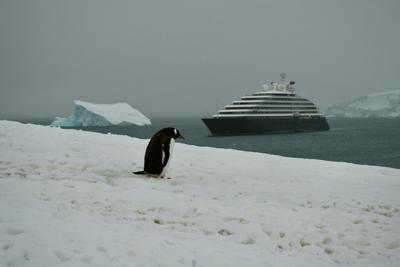By Stephen Beech
Antarctic sea life - including the oldest living creatures on the planet - are at risk from increasing number of ships dropping anchor there, warns a new report.
Underwater video footage has revealed for the first time the impact of anchor and chain damage caused by cruise, research, fishing and other vessels on the Antarctic sea floor.
Species at risk include giant volcano sponges which may live up to 15,000 years, say scientists.
Global shipping activity is becoming more widespread, even in the most remote regions of the planet.
Now, an international research team has gathered the first video evidence of anchoring and chain damage in Antarctic waters.
Study first author Matthew Mulrennan said: “This is the first time the impacts of ship anchoring and chain damage are documented in Antarctic waters.
"Activities in Antarctica have a lot of strict rules around conservation, yet ship anchoring is almost completely unregulated.”
Co-author Dr. Sally Watson, of the National Institute of Water and Atmospheric Research in New Zealand, said: “Documentation is way overdue, given the importance of these ecosystems and the protections we place on them.
"Anchoring impacts are understudied and underestimated globally.
"It’s so important to recognize and mitigate the impacts across all industries and limit planned anchoring.”
At least 195 tourism, research, and fishing vessels, as well as private yachts were recorded in anchorable depths in Antarctica during the 2022-23 season.

Jeremy Stewardson
But it is likely that more ships operate there without licenses, according to the research team.
During the austral summer of that year, the team used underwater cameras to observe the seafloor at 36 sites across the Antarctic Peninsula and South Georgia Island.
Footage, published by the journal Frontiers in Conservation Science, was captured close to the surface, midwater, and one metre above the sea floor.
It showed disturbances to the seafloor and marine life where ships had anchored.
Grooves, striations and mud deposits from anchor retrieval were visible in the substrate of the ocean floor.
At the disturbed sites, little to no marine life was present.
Instead, the researchers observed crushed sponge colonies and a lack of benthic biomass.
But, directly adjacent to the anchoring sites, marine life flourished.
Marine scientist Mulrennan, founder of the California-based Kolossal non-profit ocean exploration and conservation organization, said: “The observed damage was a near miss to three giant volcano sponges, believed to be the oldest animals on the planet which may live up to 15,000 years."
Many other species - including Antarctic sun stars, giant Antarctic octopus, sea spiders, and a variety of fish - were recorded at anchorable depths.
Mulrennan added: “The weird and wonderful animals that are impacted, like sponges, are important for filtering water, carbon sequestration, and providing shelter, food, and complex habitats which benefit the whole marine ecosystem, including penguins and seals – the animals tourists come to see."
Many of the species that live at anchorable depths in Antarctica are slow-growing, immobile and can only be found in Antarctica.
Those factors make them "particularly vulnerable" to disturbances, according to the research team.
Dr. Watson said: “We know that anchor impacts in tropical reefs can last a decade.
"In muddy sediment the scours can still be visible over a decade later.
“Ecological recovery is really site specific. Things in cold waters are much slower growing than in warmer temperatures so I expect that recovery would take longer the higher the latitude.”
The researchers say future research should look at the short- and long-term impacts of anchoring on the seabed, recovery periods, and the impacts on the broader ecosystem.
Mulrennan added: “Anchoring is likely the most overlooked ocean conservation issue in terms of global seafloor disruption; it is on par with the damages from bottom trawling.
“It’s a pressing environmental issue, but it’s out of sight, out of mind.”




